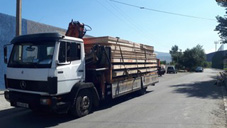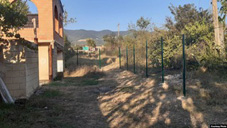
Members of Lelo deliver house for Razmadze’s family in Gori
By Nika Gamtsemlidze
Wednesday, October 2
Members of the public movement Lelo, founded by the Georgian businessman Mamuka Khazaradze delivered a gift house to the Gori district administration for the family living in Gugutiantkari.
A few months ago, after the occupation forces resumed the illegal process of borderisation, one of the houses ended up behind the so-called border. As Khazaradaze wrote on his personal Facebook page on August 16, “Givi Razmadze’s family will have a new house during the next month.”
Khazaradze also called on Georgian business to help people living near the occupation line.
According to the representatives of Lelo, the administration was informed that the house is ready and now they are expected to allocate the land where the house will be put. According to them, it is important that this house is located near the occupation line, so that Georgian citizens can live there.
As the representatives of the Gori City Hall said, they have contacted the family and they said that they are ready to receive the wooden cottage, which they will use as they want. They are refusing to be a part of any kind of political speculation.
The family does not own land in Gugutiantkari where they can put the cottage. According to Lelo representatives, they had a phone conversation with the press service of the City Hall asking them to find land for the house.
“We bought a wooden cottage that is well furnished, equipped with heating and appropriate furniture and has good living conditions. We had a phone conversation with a City Hall spokesperson about the allocation of land, but now they are reporting that we have not addressed them officially. If this bureaucratic letter is so important, we will address them officially and wait until the land is given to the family,” said one of the representatives of Lelo, Teona Dolenjashvili.
According to Dolenjashvili, Lelo does not think that putting the cottage in Gori is the right thing to do, “since our goal was to ensure that this family would live near the occupation line in Gugutiantkari.”
“If the family refuses to put this house near the occupation line then we will give it to someone who is living in Gugutiankari, near the so-called border,” noted Dolenjashvili.
As Levan Razmadze said, he is not refusing the gift, he is looking for a normal place to build it. “If they want to give me the house, they should. I will find a place for it if they don’t want to… it’s their decision. I’m not refusing the gift, but we are talking about a house, I need a normal place to build it. There are lands in Gugutiantkari but they are next to the occupation line, it’s dangerous to live there,” noted Razmadze.
After the war of 2008, Georgian and Russian authorities signed a six-point ceasefire agreement. As the agreement mandates, Russian armed forces should have been “pulled back on the line, preceding the start of hostilities.”
It has been 11 years since the war and occupation forces continue the process of so-called borderisation. The process managed to swallow numerous villages and left people without homes.


